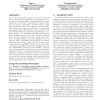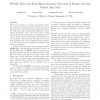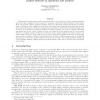186 search results - page 15 / 38 » Learning to rank at query-time using association rules |
SIGECOM
2010
ACM
14 years 12 days ago
2010
ACM
One of the fundamental problems in the theory of social choice is aggregating the rankings of a set of agents (or voters) into a consensus ranking. Rank aggregation has found appl...
SDM
2007
SIAM
13 years 9 months ago
2007
SIAM
With recent advances in sensory and mobile computing technology, enormous amounts of data about moving objects are being collected. One important application with such data is aut...
KDD
2004
ACM
14 years 8 months ago
2004
ACM
Information retrieval systems, based on keyword match, are evolving to question answering systems that return short passages or direct answers to questions, rather than URLs point...
IOR
2011
13 years 2 months ago
2011
We derive a knowledge gradient policy for an optimal learning problem on a graph, in which we use sequential measurements to refine Bayesian estimates of individual edge values i...
ICML
2000
IEEE
13 years 12 months ago
2000
IEEE
This paper considers approaches which rerank the output of an existing probabilistic parser. The base parser produces a set of candidate parses for each input sentence, with assoc...



